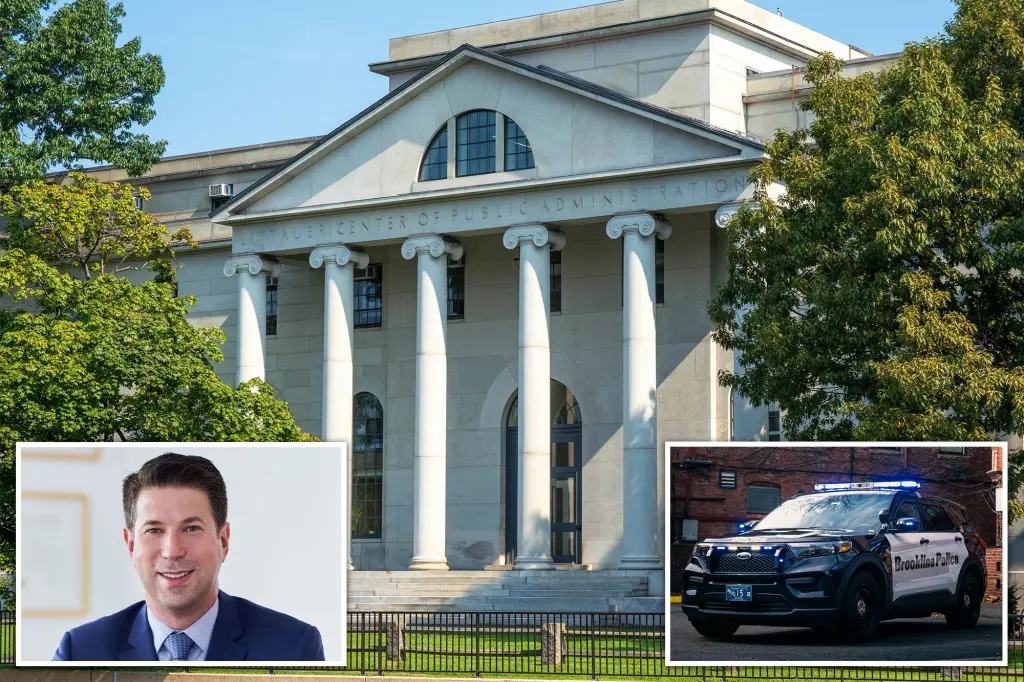Harvard Law Professor on Leave After Pellet Gun Incident Near Synagogue
In a troubling incident that occurred on the eve of Yom Kippur, Carlos Portugal Gouvea, a 43-year-old visiting professor at Harvard Law School, has been placed on administrative leave following his arrest for allegedly firing a pellet rifle outside Temple Beth Zion in Brookline. The incident, which took place as Jewish congregants were gathering for services marking the beginning of Judaism’s holiest day, triggered a substantial police response involving more than a dozen officers. While investigators do not believe Gouvea was specifically targeting the synagogue—he later claimed he was “hunting rats”—the timing and location of the incident raised immediate concerns in a community already sensitive to potential threats. Gouvea now faces multiple charges, including illegally discharging a pellet gun, disorderly conduct, disturbing the peace, and malicious damage of personal property.
The situation unfolded when two private security guards working at the synagogue heard “two loud shots” and observed Gouvea holding what appeared to be a pellet rifle. When confronted, Gouvea reportedly placed the weapon down, but a “brief physical struggle” ensued as the guards attempted to detain him. According to police reports, Gouvea then fled to his nearby residence before emerging moments later, at which point he was handcuffed and arrested by responding officers. During their investigation, police discovered a shattered car window with a pellet lodged inside the vehicle, providing physical evidence that connected to the incident. Gouvea was arraigned the following day, where he pleaded not guilty to all charges and was released on personal recognizance, with a court appearance scheduled for early November.
Harvard Law School has responded to the incident by placing Gouvea on administrative leave while they “seek to learn more about this matter,” according to spokesperson Jeff Neal. The Harvard Crimson was the first to report his suspension, though the school has not announced any further disciplinary actions at this time. Gouvea’s connection to Harvard runs deep—he is an alumnus who earned his doctorate from the university in 2008. Beyond his visiting professorship at Harvard, he serves as an associate professor at the University of São Paulo Law School and heads a Brazilian think tank focused on social and environmental justice. Neither Gouvea nor his attorney has responded to requests for comment from multiple news outlets attempting to cover the story.
The incident’s timing is particularly noteworthy, occurring as it did during the Jewish high holy days, a period of profound religious significance. While police have emphasized there was no indication the synagogue itself was targeted, the event inevitably resonates against a backdrop of increasing concerns about antisemitism. Just days before this incident, a tragic attack occurred near a synagogue in Manchester, England, where two people were killed and three others seriously injured after a man drove into pedestrians and began stabbing victims before being shot dead by police. This attack, which authorities are investigating as a potential terrorist incident, resulted in six arrests and has heightened anxieties within Jewish communities worldwide about security during religious observances.
Harvard University has found itself at the center of a nationwide debate regarding antisemitism on college campuses over the past year. The Trump administration has accused the institution of failing to adequately protect Jewish and Israeli students from harassment and has threatened to withdraw billions in federal funding unless significant reforms are implemented. The university has responded by filing a lawsuit challenging the legality of the government’s actions, arguing that the funding freezes are punitive and politically motivated. Despite the contentious nature of this dispute, reports suggest that both sides may be approaching a potential settlement. This context makes the incident involving Gouvea particularly sensitive for Harvard, as it navigates both internal disciplinary procedures and broader questions about campus climate.
While the specific motivations behind Gouvea’s alleged actions remain unclear—with his claim of “hunting rats” raising more questions than it answers—the incident highlights the tensions that can arise when personal behavior intersects with sensitive community spaces, particularly those with religious significance. The response from law enforcement, which treated the matter with immediate seriousness given its proximity to a synagogue during a major religious holiday, underscores the heightened vigilance that has become necessary in an era where religious institutions have too often become targets. For Temple Beth Zion and its congregants, the incident represented an unwelcome disruption during what should have been a time of solemn religious observance, regardless of whether there was specific intent to target their community.
As this case moves through the legal system, with Gouvea scheduled to appear again in Brookline District Court in November, it serves as a reminder of the complex interplay between individual rights, community safety, and institutional responsibility. Harvard’s decision to place Gouvea on administrative leave represents a preliminary response as they gather more information about the incident and its circumstances. For the broader community—both academic and religious—the incident highlights the ongoing challenges of ensuring safety and respect across diverse spaces while navigating the sometimes blurry lines between threatening behavior and poor judgment. Regardless of how the legal proceedings ultimately resolve, the incident has already added another layer to the continuing conversation about security, respect for religious institutions, and the responsibilities that accompany positions of academic authority.


